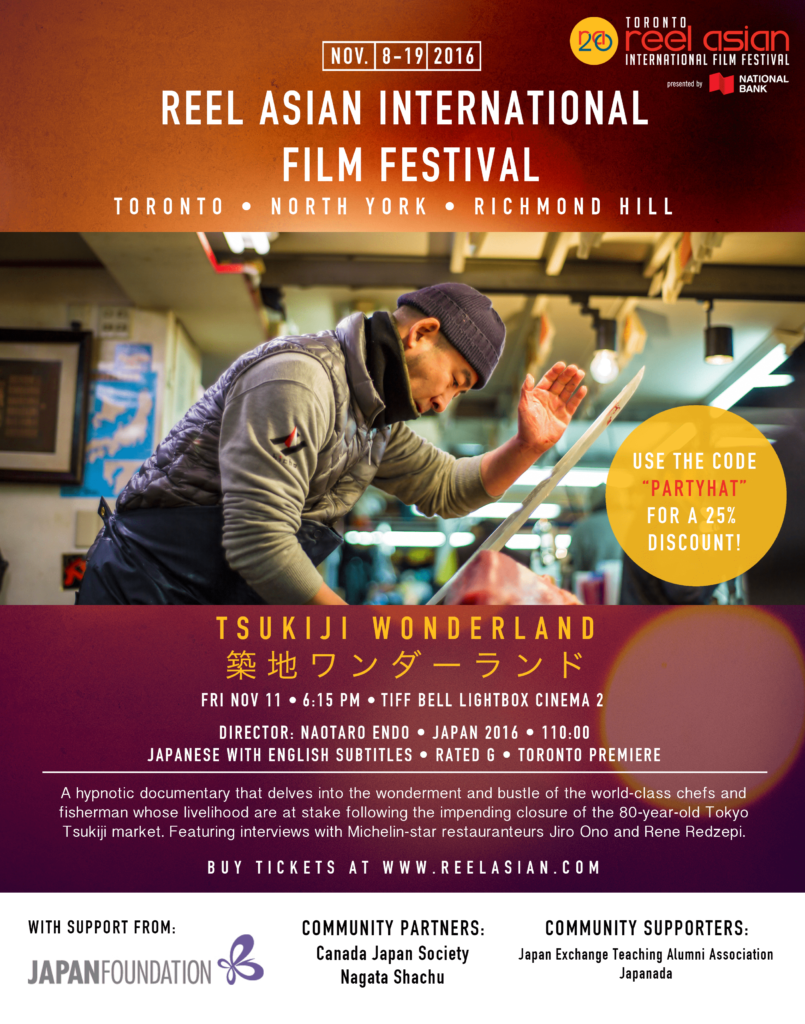By Amy Uyeda
JETAA Toronto was proud to be one of the co-presenters of Tsukiji Wonderland, which was screened as part of the Reel Asian Film Festival. Now celebrating its 20th anniversary year, Reel Asian continues to bring Asian cinema to Toronto. This screening was the Canadian premiere of Tsukiji Wonderland and the first Reel Asian film to be shown in the TIFF Bell Lightbox theatre.
Tsukiji Wonderland is a celebratory documentary about the world famous fish market in Ginza, Tokyo. The film begins and ends on panoramic shots of Tsukiji, which is situated on the coast of the metropolis, within Tokyo’s overcrowded skyline. Tsukiji resides in the heart of the city just as eating seafood is at the core of Japanese cuisine.
The film is broken into chapters thematically, depicting how Tsukiji functions, its rich history, seafood throughout each season, and of course the auctions of the ‘king of Tsukiji’- tuna! The film ends on a somewhat somber note, lamenting how the rise of instant food and the emphasis on convenience have taken time away from the joy derived from cooking and the appreciation for real, fresh ingredients. Several chapters explore the relationships between the customers and vendors of seafood, this theme is a thread throughout the film. The many relationships between the intermediary parties in this chain are crucial in shaping the journey from the ocean to the dinner plate that the bounty of seafood takes.
The fishermen and fish mongers bring their catch to market, and the wholesalers facilitate the purchase of large quantities of fish to the restauranteurs and chefs. Trust is the most important factor in this relationship. At Tsukiji, pure profit is not the primary focus; the sellers want to provide the best quality seafood to the buyers, and those buyers want to provide the best for their customers and families. Relationships are cultivated over decades, chefs become loyal to wholesalers, and both parties benefit from this trust. The film established this philosophy through several interview with people of differing roles within the marketplace. This emphasis on relationships is unique to Tsukiji and is part of its international allure. International chefs Lionel Beccat, from two-star Michelin restaurant in Tokyo, Esquisse, and Rene Redzepi, superstar chef from perennially named best restaurant in the world NOMA, make appearances. Local legend Jiro Ono (Jiro Dreams of Sushi – another great Tokyo-based food documentary) is featured as well.
Interviews with Harvard scholar Theodore C. Bestor are shown throughout the film. Bestor was studying the market long before he realized the scope of Tsukiji. From his frequent visits to the market, he grew close to several fishmongers. According to Bestor, despite the high-pressure atmosphere of the market- the stressful auctions, and the tenuous nature of depending on the weather for good catches, the people who work at Tsukiji every day genuinely seem like they are having fun. Each day at the market is different. Working there requires a calculating sense and quick thinking. Those who spend their days in the marketplace work hard and take pride in their work.
It is said that chefs from Kansai are trained to be able to make many different dishes, but Tokyo chefs are known for their specialties, and become masters within their area of expertise. Of course, their sources at Tsukiji are fundamental to this level of artistry. In one of the interviews, a man remarks “one can’t say Tsukiji is the best- it is the only one of its kind. Nothing else even compares.” In this way, the doc acts as a love letter to the longstanding traditions of Tsukiji and the Japanese work ethic that is at the heart of the market.
Amidst interviews and shots of the bustling market, there is no shortage of slow motion shots of fish being sectioned and sliced into chunks and thin sashimi slices. If you enjoy seeing master chefs form perfect pieces of sushi and ever so delicately place them on beautiful Japanese ceramic dinnerware, then this is certainly a film for you. Best to select a sushi restaurant in which to dine after the film ahead of time, you will undoubtedly be left with a desire for seafood after Tsukiji Wonderland.
Related recommendations: Jiro Dreams of Sushi ( Documentary – David Gelb, 2011)
Tsukiji by Theodore C. Bestor (University of California Press, 2004)

